Thomas James Richards, Diaries, Transcript Vol. 3, 26 January to 8 November 1916 - Part 19
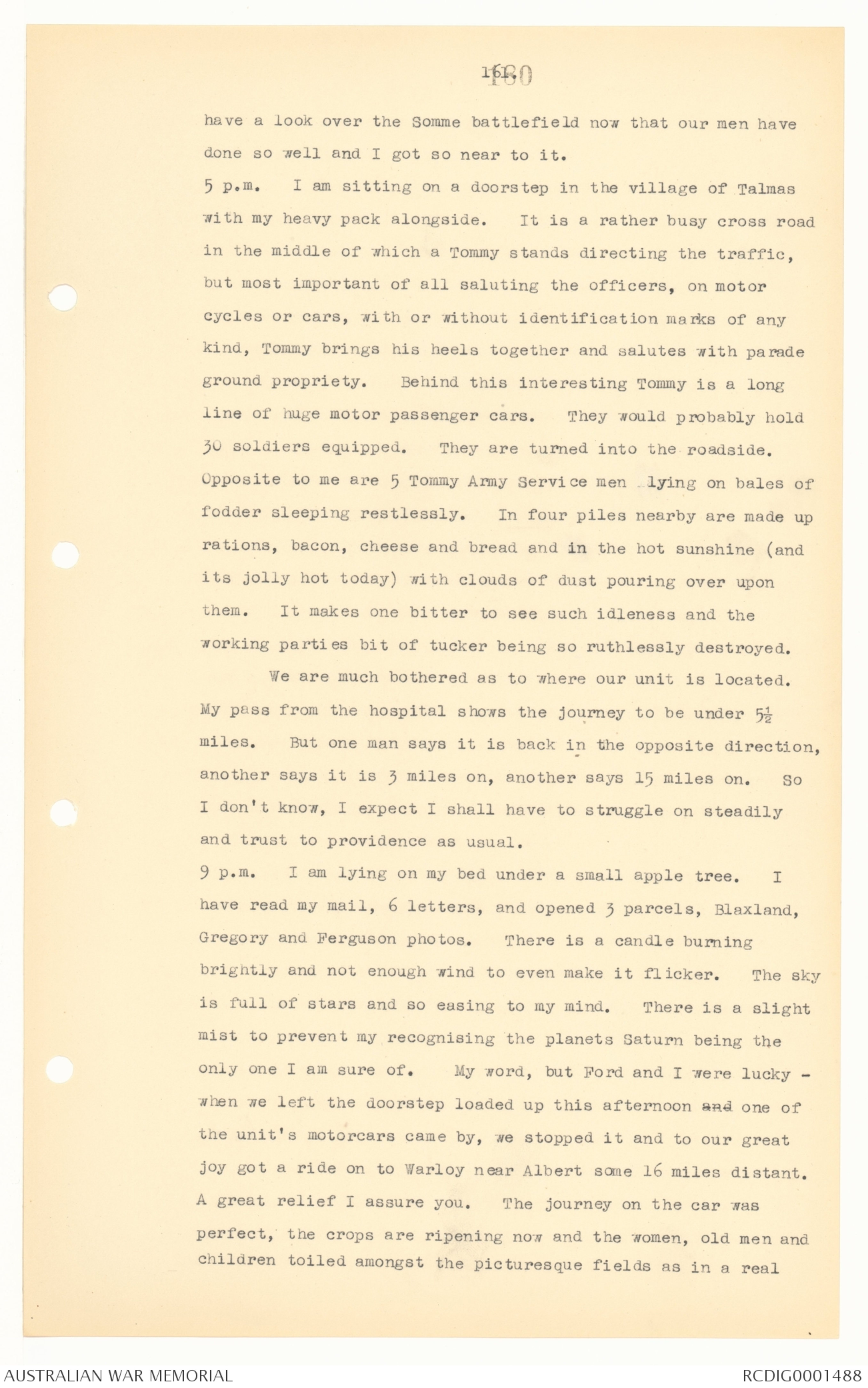
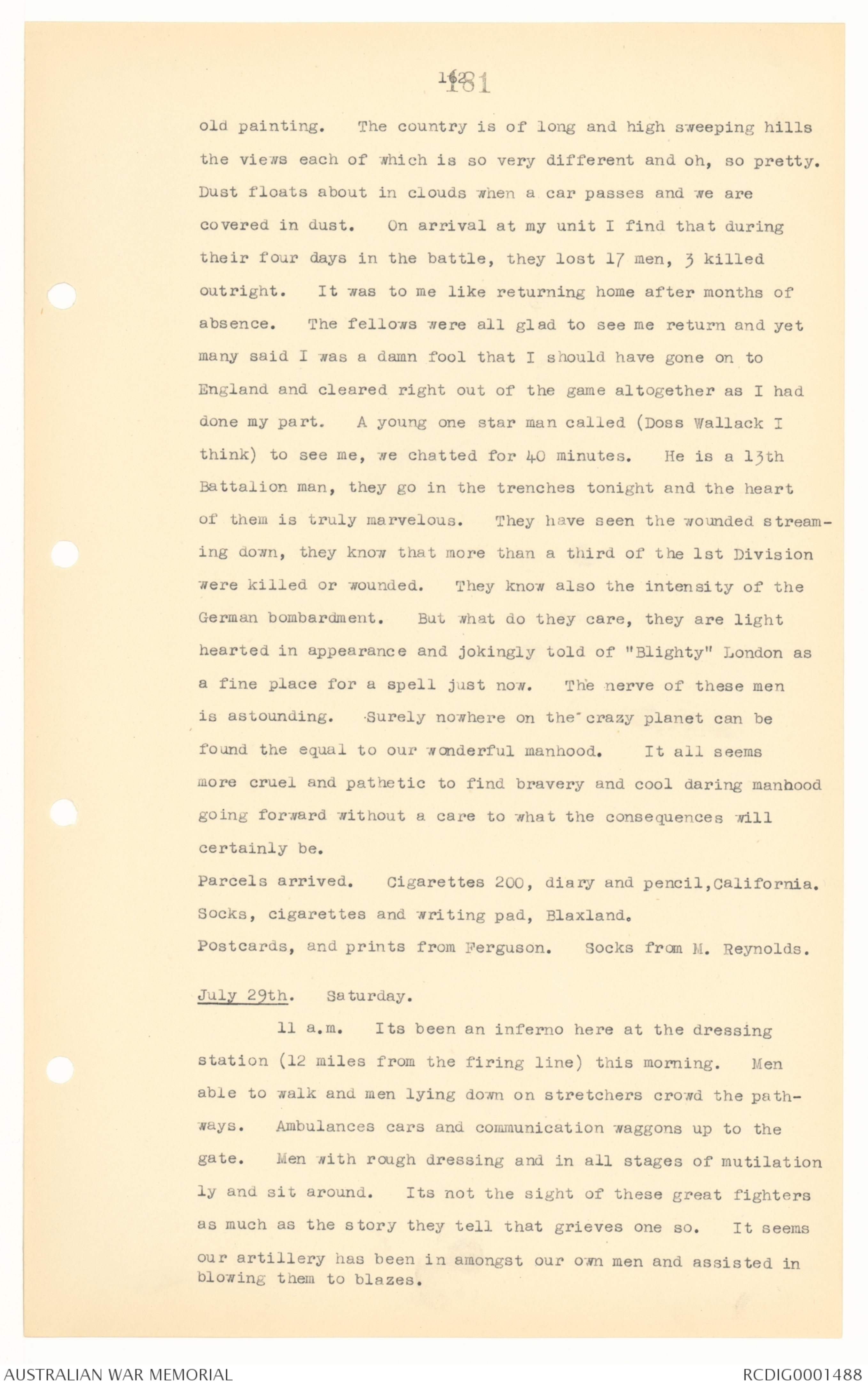
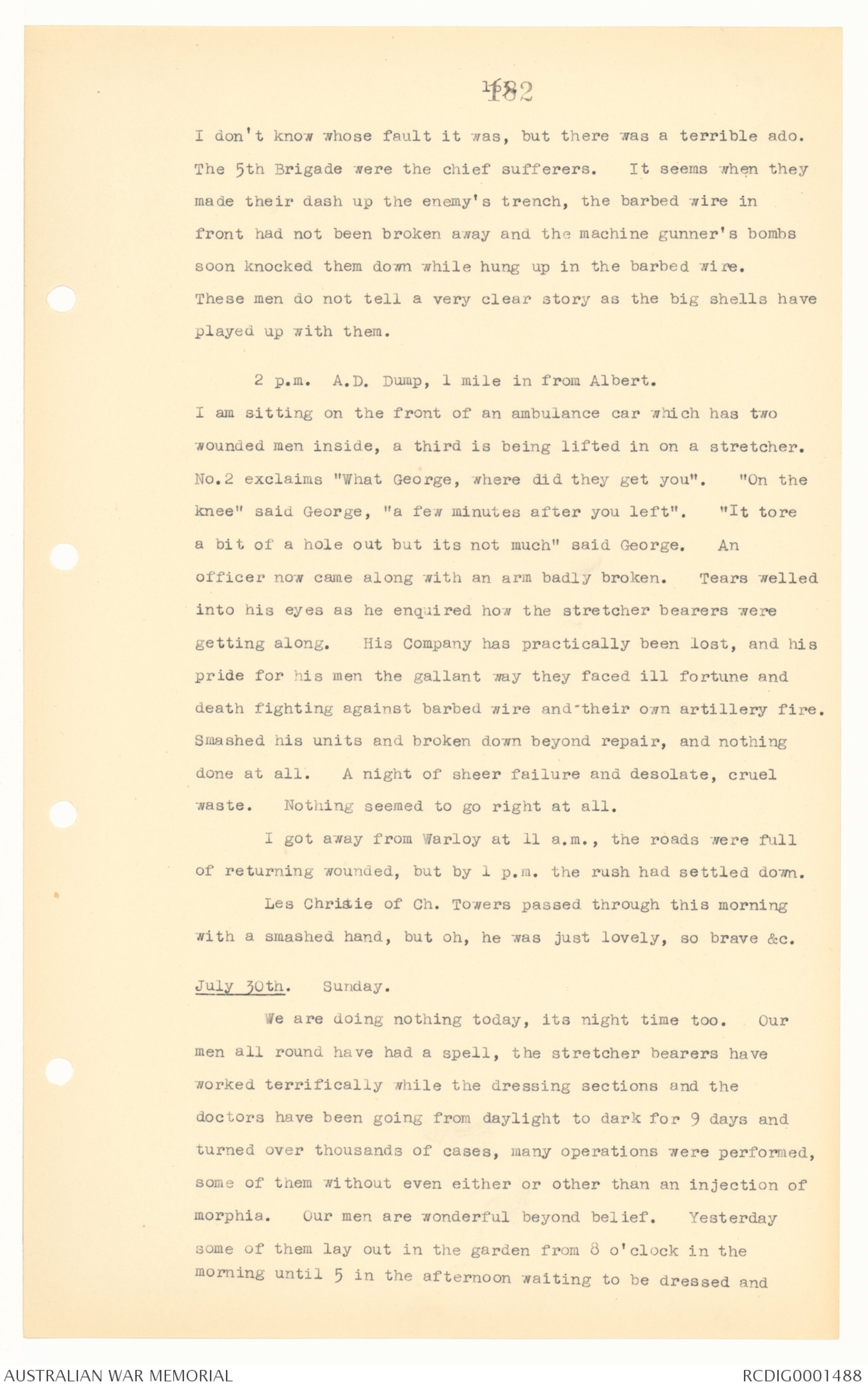
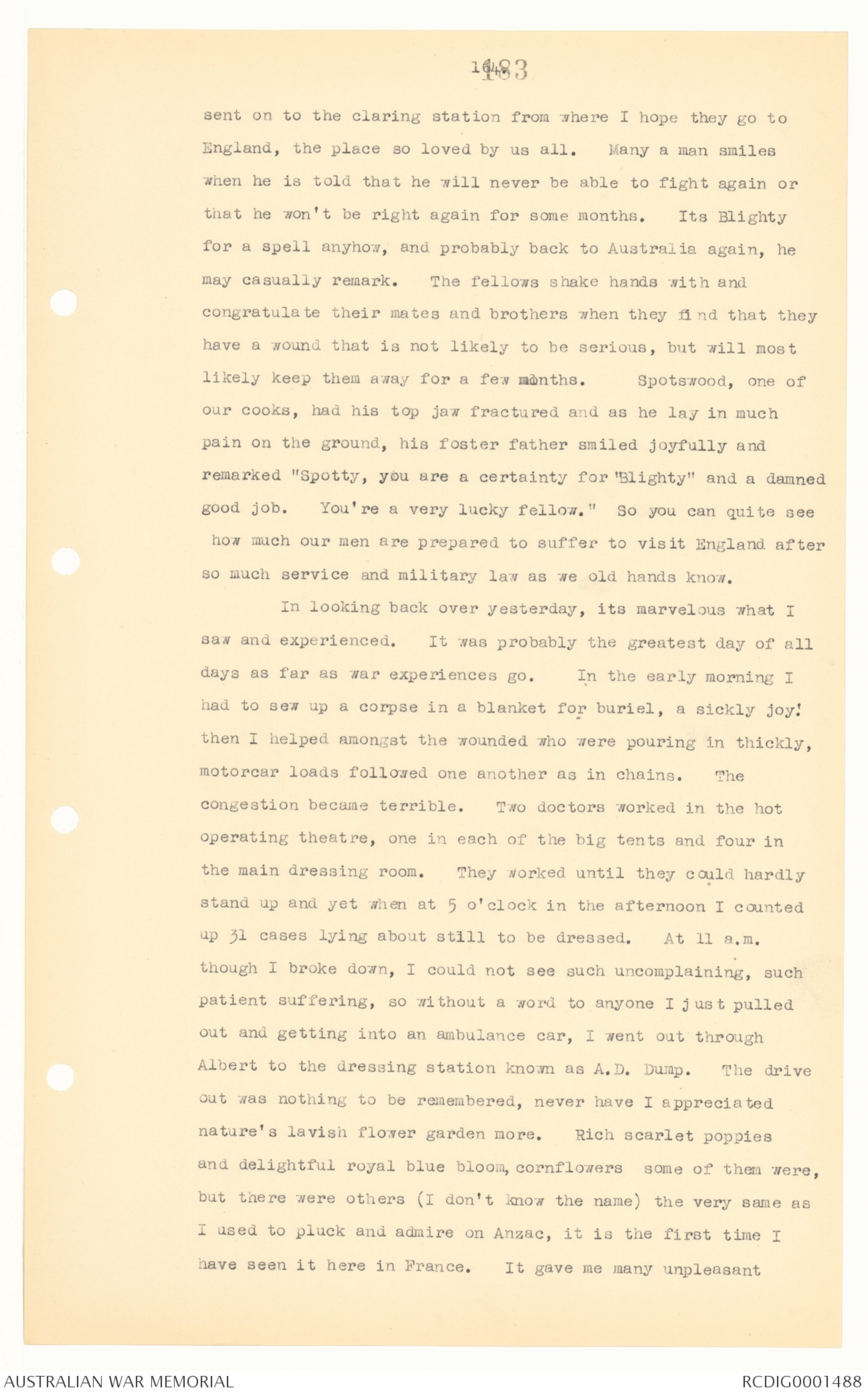
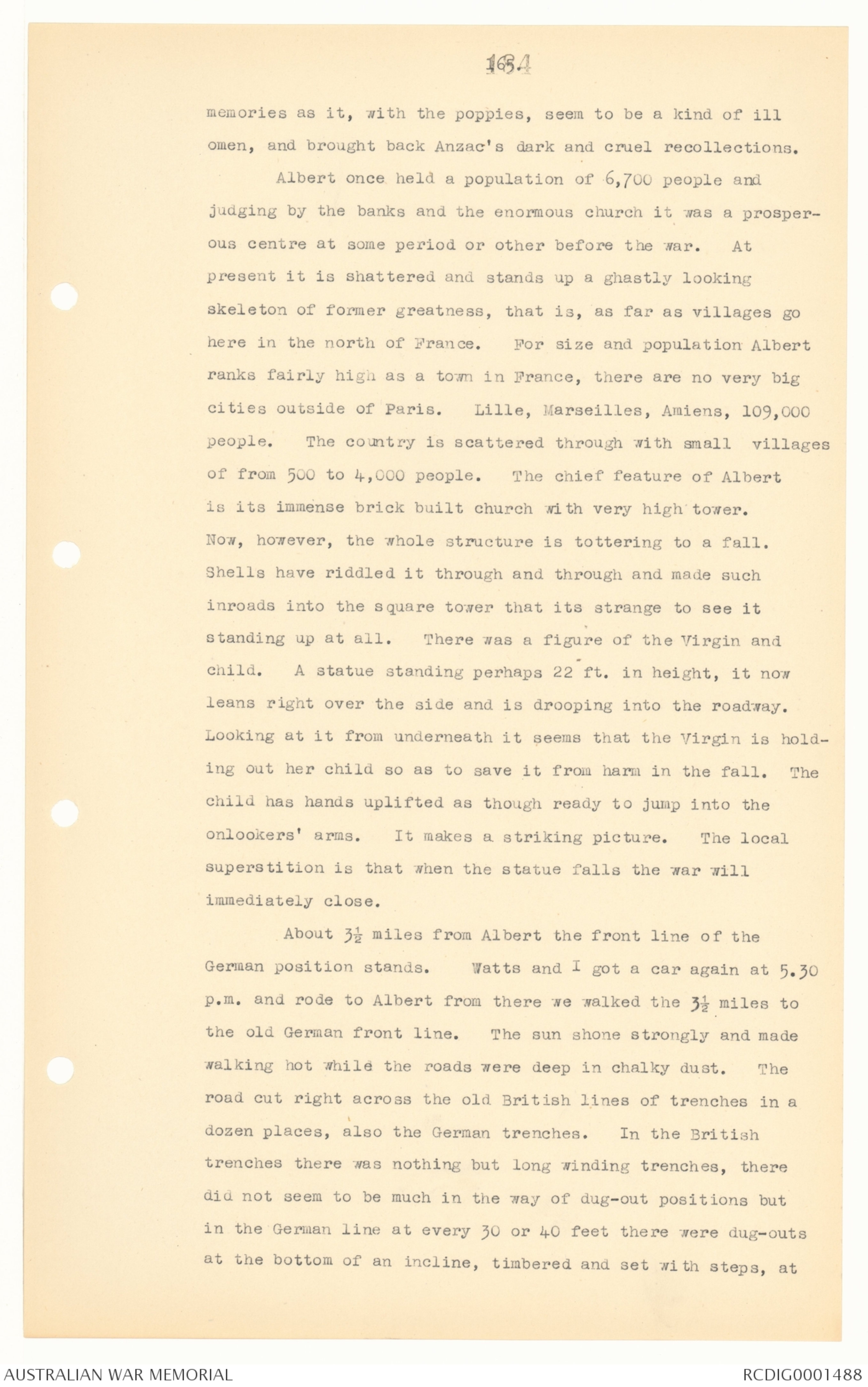
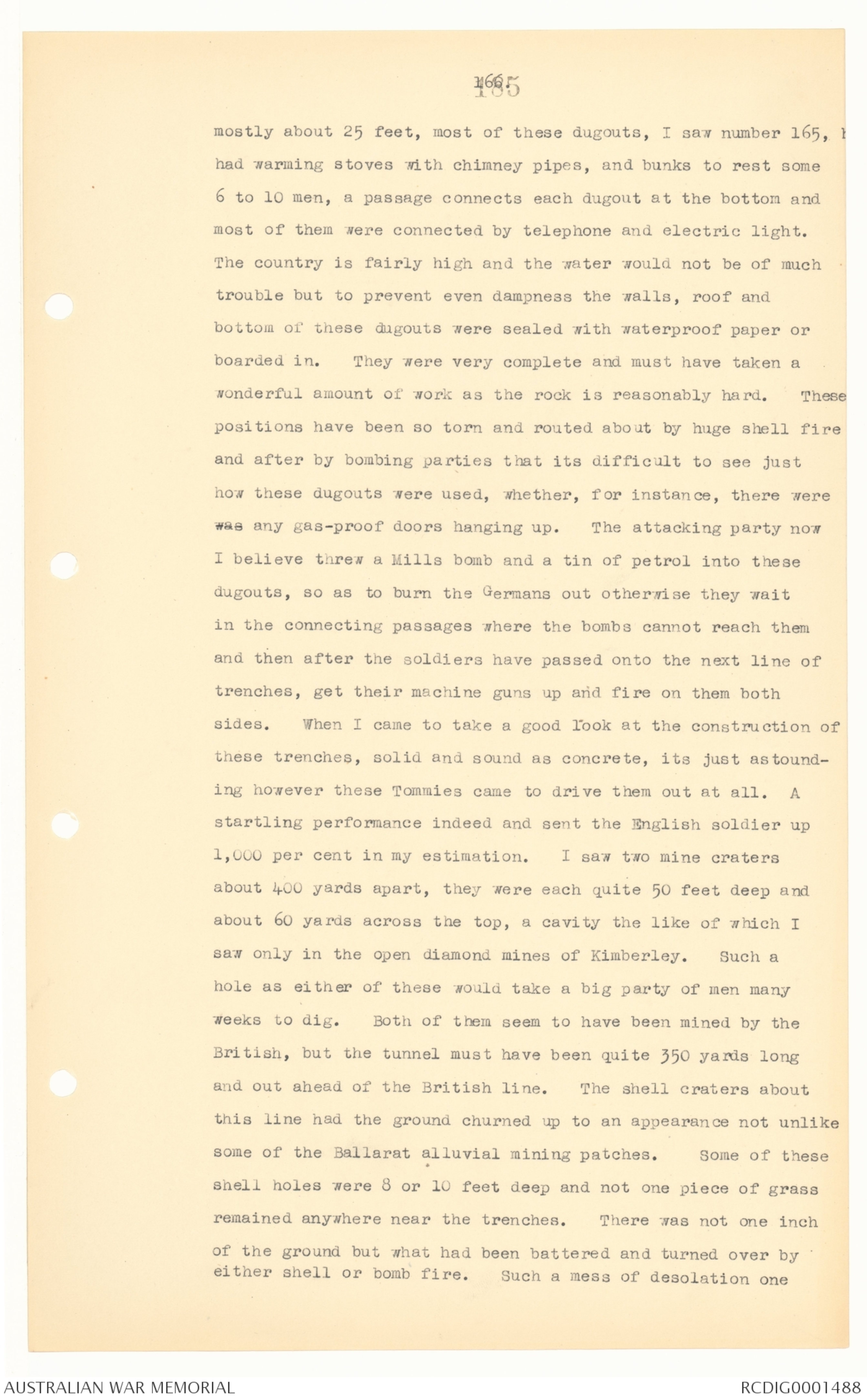
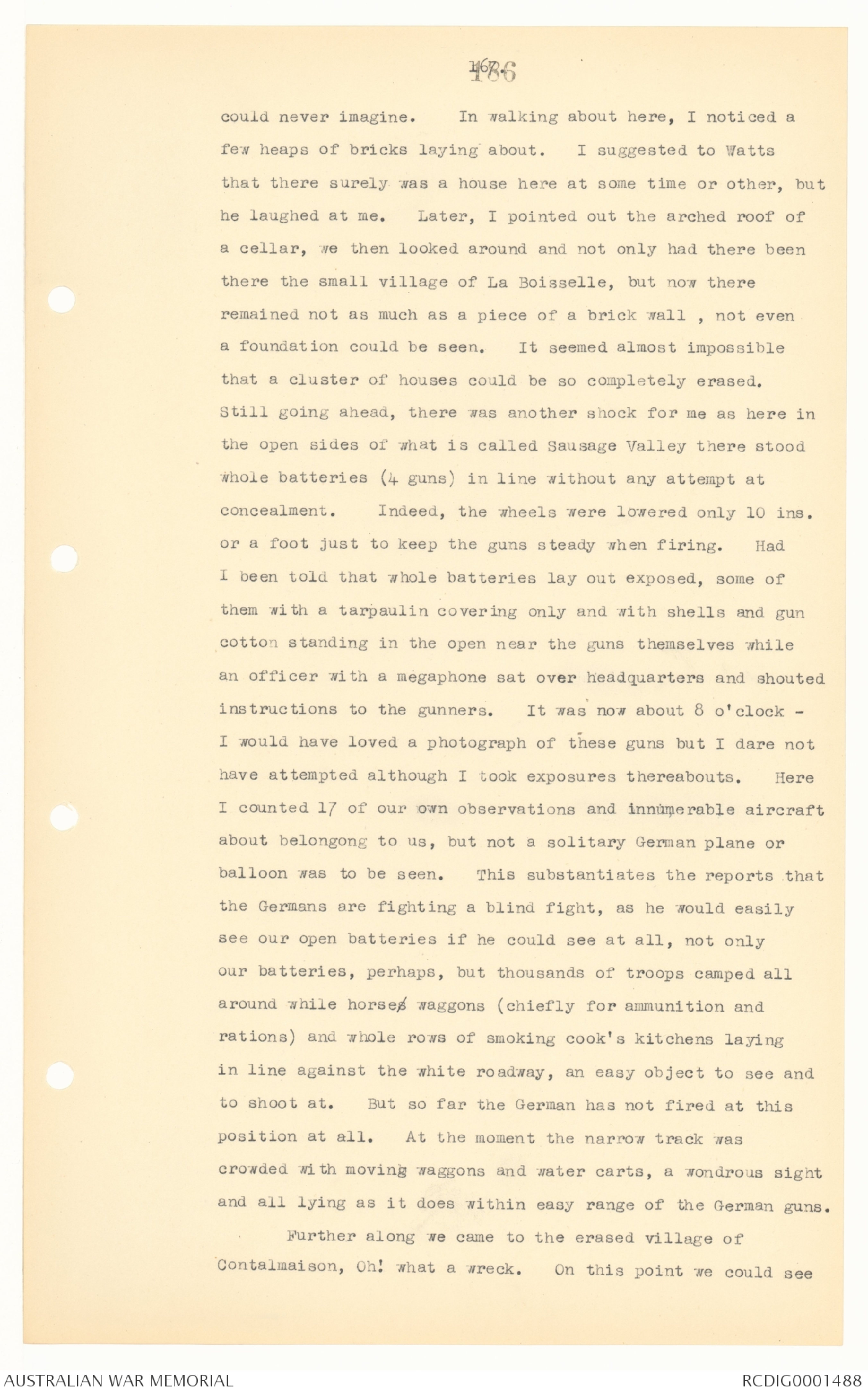
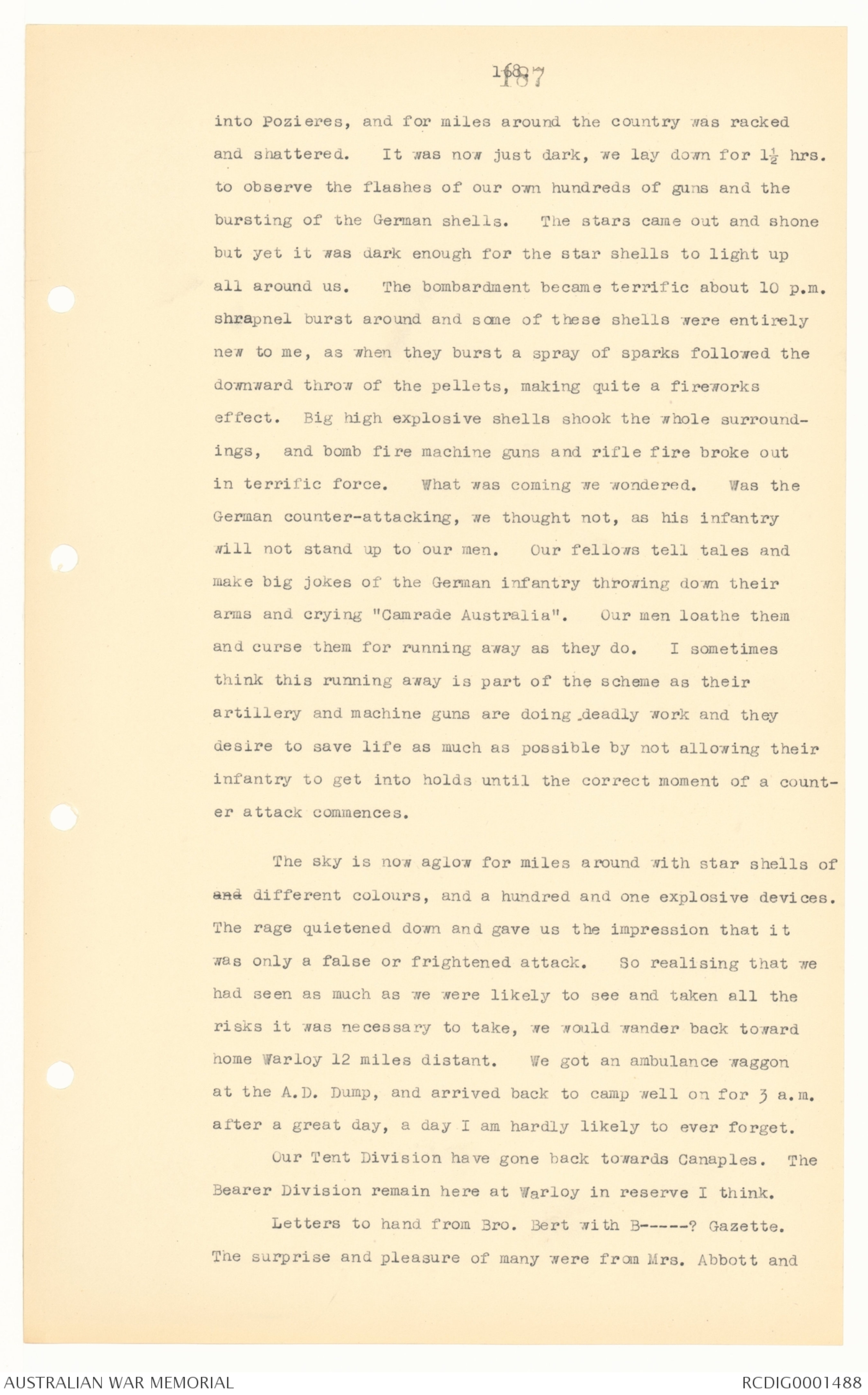
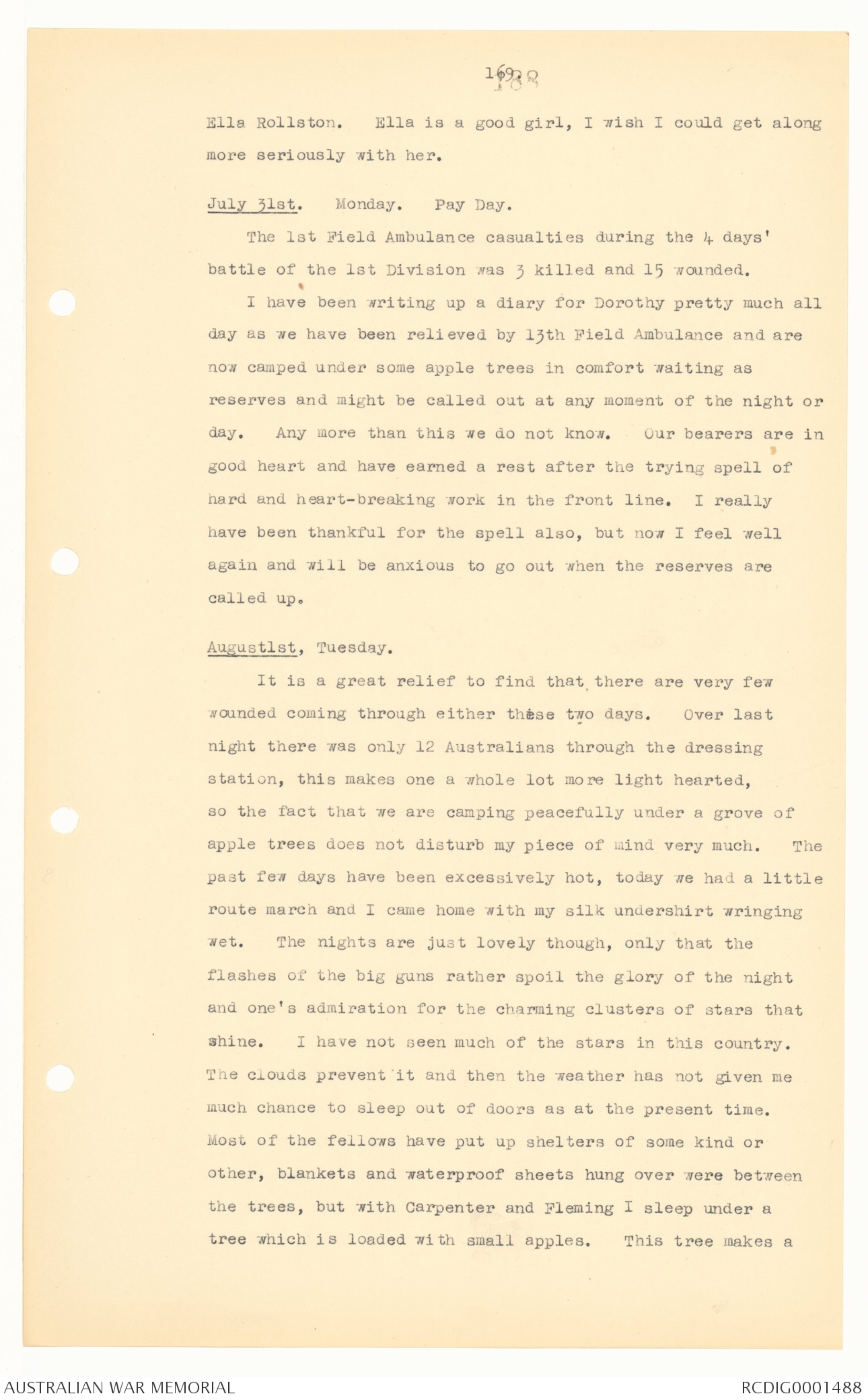
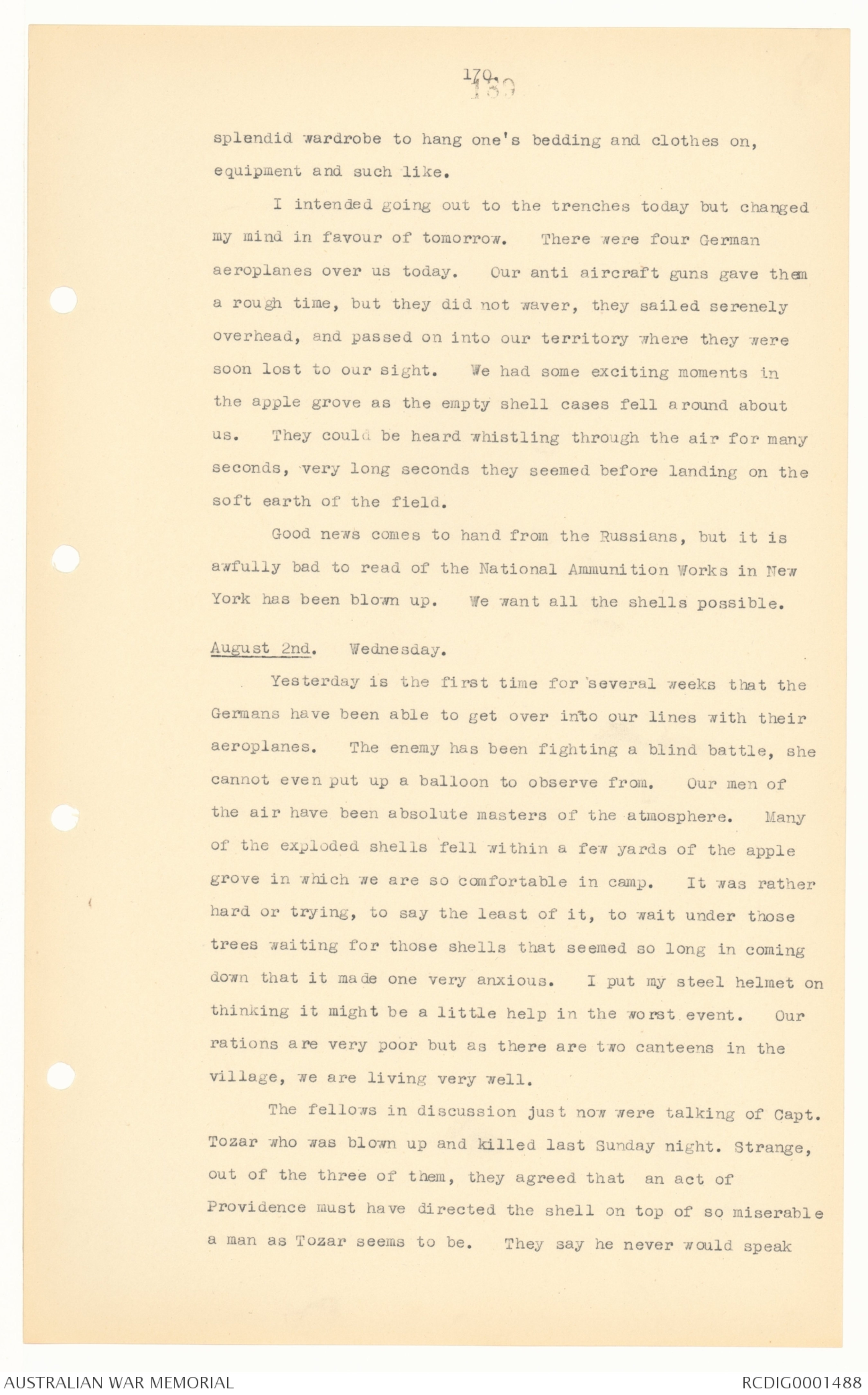
161. 180
have a look over the Somme battlefield now that our men have
done so well and I got so near to it.
5 p.m. I am sitting on a doorstep in the village of Talmas
with my heavy pack alongside. It is a rather busy cross road
in the middle of which a Tommy stands directing the traffic,
but most important of all saluting the officers, on motor
cycles or cars, with or without identification marks of any
kind, Tommy brings his heels together and salutes with parade
ground propriety. Behind this interesting Tommy is a long
line of huge motor passenger cars. They would probably hold
30 soldiers equipped. They are turned into the roadside.
Opposite to me are 5 Tommy Army Service men lying on bales of
fodder sleeping restlessly. In four piles nearby are made up
rations, bacon, cheese and bread and in the hot sunshine (and
its jolly hot today) with clouds of dust pouring over upon
them. It makes one bitter to see such idleness and the
working parties bit of tucker being so ruthlessly destroyed.
We are much bothered as to where our unit is located.
My pass from the hospital shows the journey to be under 5½
miles. But one man says it is back in the opposite direction,
another says it is 3 miles on, another says 15 miles on. So
I don't know, I expect I shall have to struggle on steadily
and trust to providence as usual.
9 p.m. I am lying on my bed under a small apple tree. I
have read my mail, 6 letters, and opened 3 parcels, Blaxland,
Gregory and Ferguson photos. There is a candle burning
brightly and not enough wind to even make it flicker. The sky
is full of stars and so easing to my mind. There is a slight
mist to prevent my recognising the planets Saturn being the
only one I am sure of. My word, but Ford and I were lucky -
when we left the doorstep loaded up this afternoon and one of
the unit's motorcars came by, we stopped it and to our great
joy got a ride on to Warloy near Albert some 16 miles distant.
A great relief I assure you. The journey on the car was
perfect, the crops are ripening now and the women, old men and
children toiled amongst the picturesque fields as in a real
162 181
old painting. The country is of long and high sweeping hills
the views each of which is so very different and oh, so pretty.
Dust floats about in clouds when a car passes and we are
covered in dust. On arrival at my unit I find that during
their four days in the battle, they lost 17 men, 3 killed
outright. It was to me like returning home after months of
absence. The fellows were all glad to see me return and yet
many said I was a damn fool that I should have gone on to
England and cleared right out of the game altogether as I had
done my part. A young one star man called (Doss Wallack I
think) to see me, we chatted for 40 minutes. He is a 13th
Battalion man, they go in the trenches tonight and the heart
of them is truly marvelous. They have seen the wounded streaming
down, they know that more than a third of the 1st Division
were killed or wounded. They know also the intensity of the
German bombardment. But what do they care, they are light
hearted in appearance and jokingly told of "Blighty" London as
a fine place for a spell just now. The nerve of these men
is astounding. Surely nowhere on the crazy planet can be
found the equal to our wonderful manhood. It all seems
more cruel and pathetic to find bravery and cool daring manhood
going forward without a care to what the consequences will
certainly be.
Parcels arrived. Cigarettes 200, diary and pencil, California.
Socks, cigarettes and writing pad, Blaxland.
Postcards, and prints from Ferguson. Socks from M. Reynolds.
July 29th. Saturday.
11 a.m. Its been an inferno here at the dressing
station (12 miles from the firing line) this morning. Men
able to walk and men lying down on stretchers crowd the pathways.
Ambulances cars and communication waggons up to the
gate. Men with rough dressing and in all stages of mutilation
ly and sit around. Its not the sight of these great fighters
as much as the story they tell that grieves one so. It seems
our artillery has been in amongst our own men and assisted in
blowing them to blazes.
163 182
I don't know whose fault it was, but there was a terrible ado.
The 5th Brigade were the chief sufferers. It seems when they
made their dash up the enemy's trench, the barbed wire in
front had not been broken away and the machine gunner's bombs
soon knocked them down while hung up in the barbed wire.
These men do not tell a very clear story as the big shells have
played up with them.
2 p.m. A.D. Dump, 1 mile in from Albert.
I am sitting on the front of an ambulance car which has two
wounded men inside, a third is being lifted in on a stretcher.
No.2 exclaims "What George, where did they get you". "On the
knee" said George, "a few minutes after you left". "It tore
a bit of a hole out but its not much" said George. An
officer now came along with an arm badly broken. Tears welled
into his eyes as he enquired how the stretcher bearers were
getting along. His Company has practically been lost, and his
pride for his men the gallant way they faced ill fortune and
death fighting against barbed wire and their own artillery fire.
Smashed his units and broken down beyond repair, and nothing
done at all. A night of sheer failure and desolate, cruel
waste. Nothing seemed to go right at all.
I got away from Warloy at 11 a.m., the roads were full
of returning wounded, but by 1 p.m. the rush had settled down.
Les Christie of Ch. Towers passed through this morning
with a smashed hand, but oh, he was just lovely, so brave &c.
July 30th. Sunday.
We are doing nothing today, its night time too. Our
men all round have had a spell, the stretcher bearers have
worked terrifically while the dressing sections and the
doctors have been going from daylight to dark for 9 days and
turned over thousands of cases, many operations were performed,
some of them without even either or other than an injection of
morphia. Our men are wonderful beyond belief. Yesterday
some of them lay out in the garden from 8 o'clock in the
morning until 5 in the afternoon waiting to be dressed and
164 183
sent on to the clearing station from where I hope they go to
England, the place so loved by us all. Many a man smiles
when he is told that he will never be able to fight again or
that he won't be right again for some months. Its Blighty
for a spell anyhow, and probably back to Australia again, he
may casually remark. The fellows shake hands with and
congratulate their mates and brothers when they find that they
have a wound that is not likely to be serious, but will most
likely keep them away for a few months. Spotswood, one of
our cooks, had his top jaw fractured and as he lay in much
pain on the ground, his foster father smiled joyfully and
remarked "Spotty, you are a certainty for "Blighty" and a damned
good job. You're a very lucky fellow." So you can quite see
how much our men are prepared to suffer to visit England after
so much service and military law as we old hands know.
In looking back over yesterday, its marvelous what I
saw and experienced. It was probably the greatest day of all
days as far as war experiences go. In the early morning I
had to sew up a corpse in a blanket for buriel, a sickly joy!
then I helped amongst the wounded who were pouring in thickly,
motorcar loads followed one another as in chains. The
congestion became terrible. Two doctors worked in the hot
operating theatre, one in each of the big tents and four in
the main dressing room. They worked until they could hardly
stand up and yet when at 5 o'clock in the afternoon I counted
up 31 cases lying about still to be dressed. At 11 a.m.
though I broke down, I could not see such uncomplaining, such
patient suffering, so without a word to anyone I just pulled
out and getting into an ambulance car, I went out through
Albert to the dressing station known as A.D. Dump. The drive
out was nothing to be remembered, never have I appreciated
nature's lavish flower garden more. Rich scarlet poppies
and delightful royal blue bloom, cornflowers, some of them were,
but there were others (I don't know the name) the very same as
I used to pluck and admire on Anzac, it is the first time I
have seen it here in France. It gave me many unpleasant
165 184
memories as it, with the poppies, seem to be a kind of ill
omen, and brought back Anzac's dark and cruel recollections.
Albert once held a population of 6,700 people and
judging by the banks and the enormous church it was a prosperous
centre at some period or other before the war. At
present it is shattered and stands up a ghastly looking
skeleton of former greatness, that is, as far as villages go
here in the north of France. For size and population Albert
ranks fairly high as a town in France, there are no very big
cities outside of Paris. Lille, Marseilles, Amiens, 109,000
people. The country is scattered through with small villages
of from 500 to 4,000 people. The chief feature of Albert
is its immense brick built church with very high tower.
Now, however, the whole structure is tottering to a fall.
Shells have riddled it through and through and made such
inroads into the square tower that its strange to see it
standing up at all. There was a figure of the Virgin and
child. A statue standing perhaps 22 ft. in height, it now
leans right over the side and is drooping into the roadway.
Looking at it from underneath it seems that the Virgin is holding
out her child so as to save it from harm in the fall. The
child has hands uplifted as though ready to jump into the
onlookers' arms. It makes a striking picture. The local
superstition is that when the statue falls the war will
immediately close.
About 3 miles from Albert the front line of the
German position stands. Watts and I got a car again at 5.30
p.m. and rode to Albert from there we walked the 3½ miles to
the old German front line. The sun shone strongly and made
walking hot while the roads were deep in chalky dust. The
road cut right across the old British lines of trenches in a
dozen places, also the German trenches. In the British
trenches there was nothing but long winding trenches, there
did not seem to be much in the way of dug-out positions but
in the German line at every 30 or 40 feet there were dug-outs
at the bottom of an incline, timbered and set with steps, at
166 185
mostly about 25 feet, most of these dugouts, I saw number 165,
had warming stoves with chimney pipes, and bunks to rest some
6 to 10 men, a passage connects each dugout at the bottom and
most of them were connected by telephone and electric light.
The country is fairly high and the water would not be of much
trouble but to prevent even dampness the walls, roof and
bottom of these dugouts were sealed with waterproof paper or
boarded in. They were very complete and must have taken a
wonderful amount of work as the rock is reasonably hard. These
positions have been so torn and routed about by huge shell fire
and after by bombing parties that its difficult to see just
how these dugouts were used, whether, for instance, there werewas any gas-proof doors hanging up. The attacking party now
I believe threw a Mills bomb and a tin of petrol into these
dugouts, so as to burn the Germans out otherwise they wait
in the connecting passages where the bombs cannot reach them
and then after the soldiers have passed onto the next line of
trenches, get their machine guns up and fire on them both
sides. When I came to take a good look at the construction of
these trenches, solid and sound as concrete, its just astounding
however these Tommies came to drive them out at all. A
startling performance indeed and sent the English soldier up
1,000 per cent in my estimation. I saw two mine craters
about 400 yards apart, they were each quite 50 feet deep and
about 60 yards across the top, a cavity the like of which I
saw only in the open diamond mines of Kimberley. Such a
hole as either of these would take a big party of men many
weeks to dig. Both of them seem to have been mined by the
British, but the tunnel must have been quite 350 yards long
and out ahead of the British line. The shell craters about
this line had the ground churned up to an appearance not unlike
some of the Ballarat alluvial mining patches. Some of these
shell holes were 8 or 10 feet deep and not one piece of grass
remained anywhere near the trenches. There was not one inch
of the ground but what had been battered and turned over by
either shell or bomb fire. Such a mess of desolation one
167 186
could never imagine. In walking about here, I noticed a
few heaps of bricks laying about. I suggested to Watts
that there surely was a house here at some time or other, but
he laughed at me. Later, I pointed out the arched roof of
a cellar, we then looked around and not only had there been
there the small village of La Boisselle, but now there
remained not as much as a piece of a brick wall, not even
a foundation could be seen. It seemed almost impossible
that a cluster of houses could be so completely erased.
Still going ahead, there was another shock for me as here in
the open sides of what is called Sausage Valley there stood
whole batteries (4 guns) in line without any attempt at
concealment. Indeed, the wheels were lowered only 10 ins.
or a foot just to keep the guns steady when firing. Had
I been told that whole batteries lay out exposed, some of
them with a tarpaulin covering only and with shells and gun
cotton standing in the open near the guns themselves while
an officer with a megaphone sat over headquarters and shouted
instructions to the gunners. It was now about 8 o'clock -
I would have loved a photograph of these guns but I dare not
have attempted although I took exposures thereabouts. Here
I counted 17 of our own observations and innumerable aircraft
about belongong to us, but not a solitary German plane or
balloon was to be seen. This substantiates the reports that
the Germans are fighting a blind fight, as he would easily
see our open batteries if he could see at all, not only
our batteries, perhaps, but thousands of troops camped all
around while horses waggons (chiefly for ammunition and
rations) and whole rows of smoking cook's kitchens laying
in line against the white roadway, an easy object to see and
to shoot at. But so far the German has not fired at this
position at all. At the moment the narrow track was
crowded with moving waggons and water carts, a wondrous sight
and all lying as it does within easy range of the German guns.
Further along we came to the erased village of
Contalmaison, Oh! what a wreck. On this point we could see
168 187
into Pozieres, and for miles around the country was racked
and shattered. It was now just dark, we lay down for 1½hrs.
to observe the flashes of our own hundreds of guns and the
bursting of the German shells. The stars came out and shone
but yet it was dark enough for the star shells to light up
all around us. The bombardment became terrific about 10 p.m.
shrapnel burst around and some of these shells were entirely
new to me, as when they burst a spray of sparks followed the
downward throw of the pellets, making quite a fireworks
effect. Big high explosive shells shook the whole surroundings,
and bomb fire machine guns and rifle fire broke out
in terrific force. What was coming we wondered. Was the
German counter-attacking, we thought not, as his infantry
will not stand up to our men. Our fellows tell tales and
make big jokes of the German infantry throwing down their
arms and crying "Camrade Australia". Our men loathe them
and curse them for running away as they do. I sometimes
think this running away is part of the scheme as their
artillery and machine guns are doing deadly work and they
desire to save life as much as possible by not allowing their
infantry to get into holds until the correct moment of a counter
attack commences.
The sky is now aglow for miles around with star shells ofand different colours, and a hundred and one explosive devices.
The rage quietened down and gave us the impression that it
was only a false or frightened attack. So realising that we
had seen as much as we were likely to see and taken all the
risks it was necessary to take, we would wander back toward
home Warloy 12 miles distant. We got an ambulance waggon
at the A.D. Dump, and arrived back to camp well on for 3 a.m.
after a great day, a day I am hardly likely to ever forget.
Our Tent Division have gone back towards Canaples. The
Bearer Division remain here at Warloy in reserve I think.
Letters to hand from Bro. Bert with B-----? Gazette.
The surprise and pleasure of many were from Mrs. Abbott and
169 188
Ella Rollston. Ella is a good girl, I wish I could get along
more seriously with her.
July 31st. Monday. Pay Day.
The 1st Field Ambulance casualties during the 4 days'
battle of the 1st Division was 3 killed and 15 wounded.
I have been writing up a diary for Dorothy pretty much all
day as we have been relieved by 13th Field Ambulance and are
now camped under some apple trees in comfort waiting as
reserves and might be called out at any moment of the night or
day. Any more than this we do not know. Our bearers are in
good heart and have earned a rest after the trying spell of
hard and heart-breaking work in the front line. I really
have been thankful for the spell also, but now I feel well
again and will be anxious to go out when the reserves are
called up.
August1st, Tuesday.
It is a great relief to find that there are very few
wounded coming through either these two days. Over last
night there was only 12 Australians through the dressing
station, this makes one a whole lot more light hearted,
so the fact that we are camping peacefully under a grove of
apple trees does not disturb my piece of mind very much. The
past few days have been excessively hot, today we had a little
route march and I came home with my silk undershirt wringing
wet. The nights are just lovely though, only that the
flashes of the big guns rather spoil the glory of the night
and one's admiration for the charming clusters of stars that
shine. I have not seen much of the stars in this country.
The clouds prevent it and then the weather has not given me
much chance to sleep out of doors as at the present time.
Most of the fellows have put up shelters of some kind or
other, blankets and waterproof sheets hung over were between
the trees, but with Carpenter and Fleming I sleep under a
tree which is loaded with small apples. This tree makes a
170 189
splendid wardrobe to hang one's bedding and clothes on,
equipment and such like.
I intended going out to the trenches today but changed
my mind in favour of tomorrow. There were four German
aeroplanes over us today. Our anti aircraft guns gave them
a rough time, but they did not waver, they sailed serenely
overhead, and passed on into our territory where they were
soon lost to our sight. We had some exciting moments in
the apple grove as the empty shell cases fell around about
us. They could be heard whistling through the air for many
seconds, very long seconds they seemed before landing on the
soft earth of the field.
Good news comes to hand from the Russians, but it is
awfully bad to read of the National Ammunition Works in New
York has been blown up. We want all the shells possible.
August 2nd. Wednesday.
Yesterday is the first time for several weeks that the
Germans have been able to get over into our lines with their
aeroplanes. The enemy has been fighting a blind battle, she
cannot even put up a balloon to observe from. Our men of
the air have been absolute masters of the atmosphere. Many
of the exploded shells fell within a few yards of the apple
grove in which we are so comfortable in camp. It was rather
hard or trying, to say the least of it, to wait under those
trees waiting for those shells that seemed so long in coming
down that it made one very anxious. I put my steel helmet on
thinking it might be a little help in the worst event. Our
rations are very poor but as there are two canteens in the
village, we are living very well.
The fellows in discussion just now were talking of Capt.
Tozar who was blown up and killed last Sunday night. Strange,
out of the three of them, they agreed that an act of
Providence must have directed the shell on top of so miserable
a man as Tozar seems to be. They say he never would speak
 Sandy Mudie
Sandy MudieThis transcription item is now locked to you for editing. To release the lock either Save your changes or Cancel.
This lock will be automatically released after 60 minutes of inactivity.